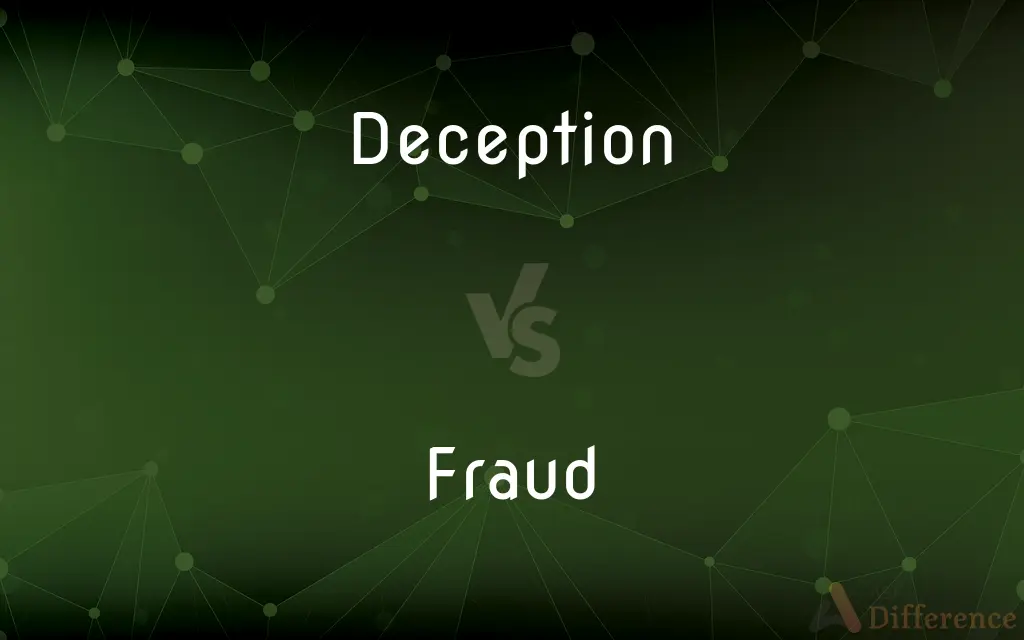Deception vs. Fraud — What's the Difference?
By Tayyaba Rehman — Updated on September 14, 2023
Deception involves misleading or causing someone to believe what isn't true, while fraud is deceit with the intention of achieving unlawful gain.

Difference Between Deception and Fraud
Table of Contents
ADVERTISEMENT
Key Differences
Deception and Fraud, while inherently related, differ primarily in intention and consequence. Deception broadly encompasses the act of misleading someone or causing them to believe something that is not true. It can be used in various contexts, from magic tricks to strategic feints in warfare. On the other hand, Fraud is a subset of deception, specifically used in legal contexts, denoting deceit with the intention of securing unlawful or unfair gain, often financial.
In a more intimate understanding, Deception might not always have malicious intent or lead to harm. A surprise party, for example, involves deceiving the person being surprised. Fraud, however, inherently carries the weight of malicious intent, often aiming to deprive someone else of their rights, property, or legal due.
Furthermore, while deception can be either an act or a state of being, Fraud is typically an act, often premeditated, with the goal of personal gain at another's expense. A person might live in self-deception, misguiding themselves, but fraud requires the act of misleading others.
Summarily, while both Deception and Fraud involve a form of untruth or misleading, the key differentiator lies in intent and outcome. Deception can exist without the intent of harm or personal gain, whereas Fraud is intrinsically tied to deceit with the goal of unlawful advantage.
Comparison Chart
Definition
The act of misleading or causing belief in untruth.
Deceit intended for unlawful or unfair gain.
ADVERTISEMENT
Intent
Can be without malicious intent.
Always involves malicious intent.
Context
Broadly used in various scenarios.
Specifically legal and financial contexts.
Nature
Can be an act or a state of being.
Typically a premeditated act.
Outcome
Might not result in harm or personal gain.
Results in personal gain at another's expense.
Compare with Definitions
Deception
The state of being deceived.
Living in self-deception, she believed all was well.
Fraud
Intentional deception resulting in injury to another.
The counterfeit medicine not only was a fraud but also harmed patients.
Deception
The act of causing someone to believe what is not true.
The magician's trick was a mere deception.
Fraud
Deceitful activity or impersonation for personal gain.
The bogus investments were a clear fraud.
Deception
A strategy to mislead or distract.
The army used deception to ambush the enemy.
Fraud
A dishonest or illegal scheme.
The pyramid scheme was exposed as a massive fraud.
Deception
An illusion or falsehood.
The oasis in the desert turned out to be a deception.
Fraud
Act of deceiving or misrepresenting for unjust advantage.
The misrepresentation of product features was a blatant fraud.
Deception
Misrepresentation or distortion of the truth.
His tales of adventure were filled with deception.
Fraud
In law, fraud is intentional deception to secure unfair or unlawful gain, or to deprive a victim of a legal right. Fraud can violate civil law (e.g., a fraud victim may sue the fraud perpetrator to avoid the fraud or recover monetary compensation) or criminal law (e.g., a fraud perpetrator may be prosecuted and imprisoned by governmental authorities), or it may cause no loss of money, property, or legal right but still be an element of another civil or criminal wrong.
Deception
Deception or falsehood is an act or statement which misleads, hides the truth, or promotes a belief, concept, or idea that is not true. It is often done for personal gain or advantage.
Fraud
A deception practiced in order to induce another to give up possession of property or surrender a right.
Deception
The use of deceit.
Fraud
A piece of trickery; a trick.
Deception
The fact or state of being deceived.
Fraud
One that defrauds; a cheat.
Deception
A ruse; a trick.
Fraud
One who assumes a false pose; an impostor.
Deception
An instance of actions and/or schemes fabricated to mislead someone into believing a lie or inaccuracy.
Fraud
(law) The crime of stealing or otherwise illegally obtaining money by use of deception tactics.
Deception
The act of deceiving or misleading.
Fraud
Any act of deception carried out for the purpose of unfair, undeserved and/or unlawful gain.
Deception
The state of being deceived or misled.
There is one thing relating either to the action or enjoyments of man in which he is not liable to deception.
Fraud
The assumption of a false identity to such deceptive end.
Deception
That which deceives or is intended to deceive; false representation; artifice; cheat; fraud.
There was of course room for vast deception.
Fraud
A person who performs any such trick.
Deception
A misleading falsehood
Fraud
(obsolete) A trap or snare.
Deception
The act of deceiving
Fraud
(obsolete) To defraud
Deception
An illusory feat; considered magical by naive observers
Fraud
Deception deliberately practiced with a view to gaining an unlawful or unfair advantage; artifice by which the right or interest of another is injured; injurious stratagem; deceit; trick.
If success a lover's toil attends,Few ask, if fraud or force attained his ends.
Fraud
An intentional perversion of truth for the purpose of obtaining some valuable thing or promise from another.
Fraud
A trap or snare.
To draw the proud King Ahab into fraud.
Fraud
Intentional deception resulting in injury to another person
Fraud
A person who makes deceitful pretenses
Fraud
Something intended to deceive; deliberate trickery intended to gain an advantage
Fraud
A person who pretends to be what he/she is not.
Claiming to be a war hero when he never served made him a fraud.
Common Curiosities
Can deception ever be harmless?
Yes, deception can be harmless, like in the case of surprise parties or magic tricks.
Can self-deception be harmful?
Yes, living in denial or self-deception can lead to poor decisions and emotional distress.
Is fraud always illegal?
Yes, fraud is inherently deceit with the intent of unlawful gain and is considered illegal.
Can a business tactic be both a deception and fraud?
If a business tactic misleads without causing harm, it's deception. If it seeks unlawful gain, it's fraud.
Is a white lie a form of deception?
Yes, a white lie is a form of deception, even if its intent is often to spare feelings or avoid harm.
What's the key difference between deception and fraud?
The key difference lies in intent; fraud always aims for personal, often unlawful, gain.
Can someone be charged for deception?
It depends on the context. If the deception leads to harm or loss, legal consequences might follow.
Are all deceptions fraudulent?
No, not all deceptions are fraudulent. Deception becomes fraud when used for illegal or unjust advantage.
How can one differentiate between business strategy and fraud?
Business strategies are legal means to achieve an end, while fraud involves deceit for unlawful gain.
Can deception be unintentional?
Deception usually involves intent, but one can unintentionally perpetuate a deception they believe is true.
Share Your Discovery

Previous Comparison
Atheist vs. Heathen
Next Comparison
Robe vs. SkirtAuthor Spotlight
Written by
Tayyaba RehmanTayyaba Rehman is a distinguished writer, currently serving as a primary contributor to askdifference.com. As a researcher in semantics and etymology, Tayyaba's passion for the complexity of languages and their distinctions has found a perfect home on the platform. Tayyaba delves into the intricacies of language, distinguishing between commonly confused words and phrases, thereby providing clarity for readers worldwide.
















































